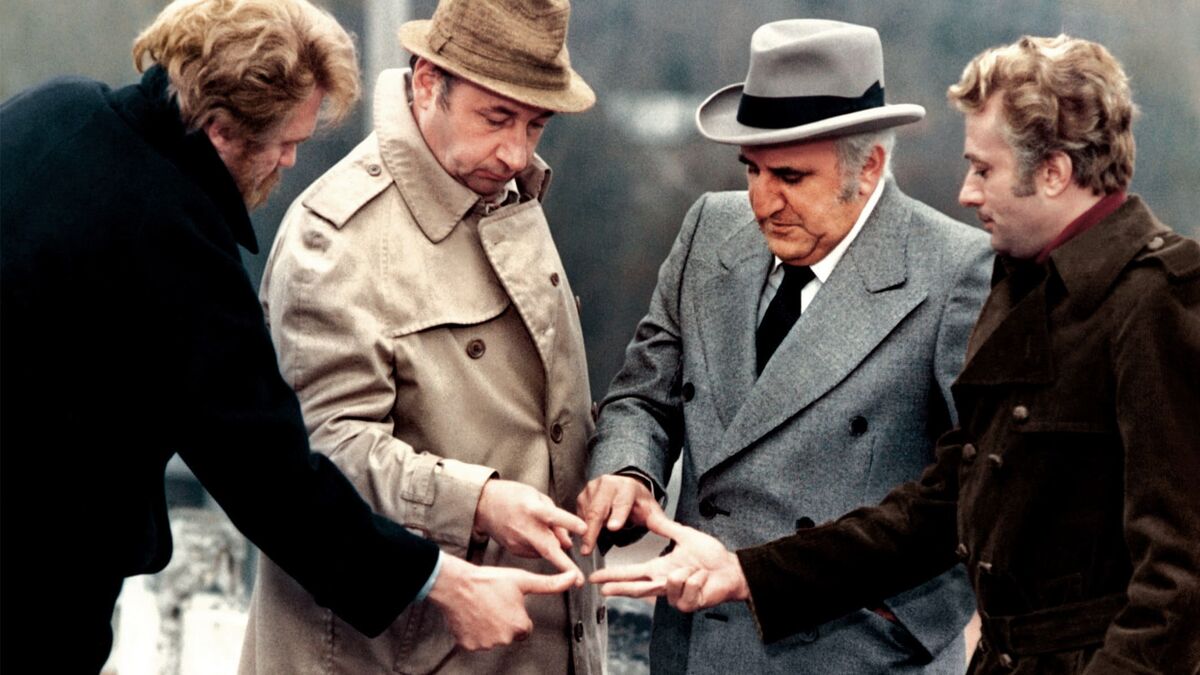Mario Monicelli was a highly respected Italian film director and screenwriter best known for his contributions to the Commedia all’Italiana genre. His illustrious career was marked by numerous successful films, with I soliti ignoti (Big Deal on Madonna Street) and La Grande Guerra (The Great War) among his most acclaimed works.
Monicelli studied at the University of Milan before venturing into the world of cinema. He began his career as a film critic and screenwriter before eventually transitioning to directing. Throughout his career, he developed a reputation for his insightful, humorous, and often poignant depictions of Italian society and everyday life.
Monicelli’s films frequently revolve around societal themes and the struggles of the working class, often viewed through the lens of dark humour and biting satire. His filmmaking approach often combined farce and slapstick elements with biting social commentary, creating a unique blend of humour and melancholy. I soliti ignoti is a prime example of this style, illustrating the exploits of amateur criminals in a comic yet empathetic manner.
Commedia all’italiana
Visually, Monicelli’s style is marked by its realism. He often employed location shooting and non-professional actors to create an authentic atmosphere and infuse his films with a sense of lived experience. La Grande Guerra showcased this visual approach effectively, capturing the bleak realities of World War I through a uniquely Italian perspective.
Monicelli’s influence on cinema has been profound, especially within Italy. His approach to blending comedy and social commentary paved the way for many directors, including Dino Risi and Ettore Scola. Internationally, his influence can be seen in the works of directors like Woody Allen, who has similarly used comedy to explore complex social themes. Despite occasional criticisms for his cynical outlook, Monicelli’s legacy in Italian cinema remains strong, and his contributions to the Commedia all’Italiana genre continue to be celebrated for their incisive humour and social relevance.

Mario Monicelli (1915 – 2010)
Calculated Films:
- Cops and Robbers (1951)
- Big Deal on Madonna Street (1958)
- The Great War (1959)
- The Organizer (1963)
- For Love and Gold (1966)
- My Friends (1975)
- An Average Little Man (1977)
- The Marquis of Grillo (1981)
- My Friends Act II(1982)
Similar Filmmakers
- Alberto Lattuada
- Antonio Pietrangeli
- Billy Wilder
- Dino Risi
- Ettore Scola
- Federico Fellini
- Giuseppe Tornatore
- Lina Wertmuller
- Luciano Salce
- Luigi Comencini
- Marco Bellocchio
- Marco Ferreri
- Mauro Bolognini
- Nanni Loy
- Nanni Moretti
- Pietro Germi
- Steno
- Vittorio De Sica



Mario Monicelli’s Top 10 Films Ranked
1. The Great War (1959)
Genre: War, Comedy

2. Big Deal on Madonna Street (1958)
Genre: Heist Film, Comedy

3. The Organizer (1963)
Genre: Cinema Politico Italiano, Comedy

4. An Average Little Man (1977)
Genre: Drama, Satire

5. My Friends (1975)
Genre: Black Comedy

6. For Love and Gold (1966)
Genre: Medieval, Adventure, Parody, Comedy

7. Cops and Robbers (1951)
Genre: Comedy

8. The Marquis of Grillo (1981)
Genre: Comedy, Satire

9. My Friends Act II (1982)
Genre: Black Comedy

10. Dearest Relatives, Poisonous Relations (1992)
Genre: Black Comedy

Mario Monicelli: Themes and Style
Themes:
- Social Critique: Monicelli’s films often address socio-political issues, providing a critical examination of Italian society. He explores themes like poverty, the class struggle, and the conflicts between individuals and society.
- Commedia all’italiana: He was instrumental in developing this genre, which combines humour with serious and often tragic themes. These films often address Italy’s social and economic conditions.
- War & Resistance: Several of his films, such as La Grande Guerra, delve into themes of war and resistance, typically underscoring the absurdity and tragedy of conflict.
- Friendship & Solidarity: Monicelli often depicted deep bonds of friendship and solidarity among his characters, typically set against the backdrop of challenging circumstances.
Styles:
- Dark Comedy: Monicelli masterfully blends comedy with tragic elements, crafting films that induce laughter while provoking contemplation on serious themes.
- Realism: His films often exhibit a sense of realism, capturing the everyday lives and struggles of ordinary people. The use of on-location shooting and non-professional actors contributes to this effect.
- Character-Driven Narratives: Monicelli’s films are known for their strong character development, with narratives that are deeply intertwined with the protagonists’ psychological and emotional states.
- Visual Composition: He employed dynamic and sophisticated visual styles, including effective use of mise-en-scène and camera movements to convey the narrative’s emotional tone.
Directorial Signature:
- Satirical Element: His work is characterised by a distinct satirical element, where he uses humour as a tool to criticise societal norms and behaviours.
- Humanist Approach: Despite the often tragic and complex themes explored, his films invariably showcase a humanistic perspective, emphasising the dignity and worth of all individuals.
- Mastery of Genre Blending: Monicelli was adept at blending various genres, seamlessly integrating elements of comedy, drama, and tragedy to create films that are both entertaining and thought-provoking.
Mario Monicelli: The 139th Greatest Director




